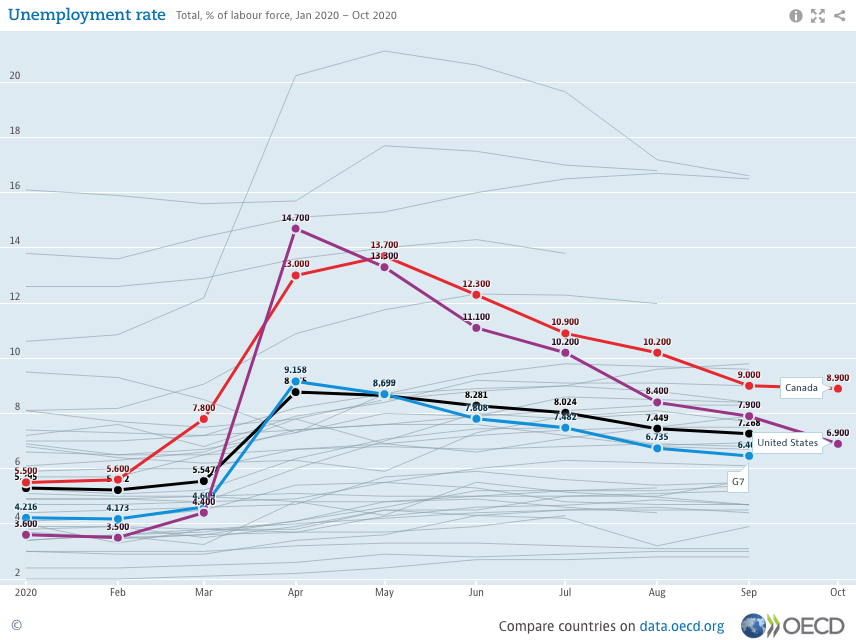
What have we learned, what have done in the ten years since #OccupyWallStreet first raised attention to growing inequalities in incomes and wealth?
This thread reflects on a series of decade-old posts I wrote to communicate important facts and policy lessons from good economics.
This thread reflects on a series of decade-old posts I wrote to communicate important facts and policy lessons from good economics.
10 years ago a @globeandmail columnist wrote
"our system redistributes the wealth ... from middle-class workers in the private sector to inefficient and expensive unions in the public sector. Among the biggest beneficiaries of this redistribution is the higher-education industry"
"our system redistributes the wealth ... from middle-class workers in the private sector to inefficient and expensive unions in the public sector. Among the biggest beneficiaries of this redistribution is the higher-education industry"
So in my first post I pit Margaret Wente against @MarkJCarney to suggest a first lesson: park your ideology and focus on good economics to recognize the problem and offer effective policy options.
milescorak.com/2011/11/09/ine…
milescorak.com/2011/11/09/ine…
The objective of my series of #OccupyWallStreet posts, was to bring the facts and lessons from economic research to the political debate.
So Lesson 2 is start with the facts. Occupiers had their facts right, top-end inequality had been on the rise
milescorak.com/2011/11/10/ine…
So Lesson 2 is start with the facts. Occupiers had their facts right, top-end inequality had been on the rise
milescorak.com/2011/11/10/ine…
But how to interpret the fact that top end inequality was on the rise. There's a justification that top one percenters are more talented and merit their incomes and wealth.
Occupiers need to understand this logic to assess in what measure it is true.
milescorak.com/2011/11/10/ine…
Occupiers need to understand this logic to assess in what measure it is true.
milescorak.com/2011/11/10/ine…
Talent determines incomes, but can it justify inequality? Where does the talent come from? And how do social institutions reward it?
What if "daddy put you in the top one percent?"
This post explains the role of family background and luck in top incomes
milescorak.com/2011/11/11/ine…
What if "daddy put you in the top one percent?"
This post explains the role of family background and luck in top incomes
milescorak.com/2011/11/11/ine…
But why does all this matter?
"There is nothing wrong with inequality … until it starts limiting opportunity."
Lesson 5: countries with more inequality are more likely to pass inequality across generations.
#GreatGatsbyCurve
milescorak.com/2011/11/17/ine…
"There is nothing wrong with inequality … until it starts limiting opportunity."
Lesson 5: countries with more inequality are more likely to pass inequality across generations.
#GreatGatsbyCurve
milescorak.com/2011/11/17/ine…
So what can we do about inequality?
Occupiers need to start with core principles guiding efficient and equitable taxation
Lesson 6: the tax system should treat a dollar the same regardless of how it is earned ... no special exemptions for capital income
milescorak.com/2011/11/30/ine…
Occupiers need to start with core principles guiding efficient and equitable taxation
Lesson 6: the tax system should treat a dollar the same regardless of how it is earned ... no special exemptions for capital income
milescorak.com/2011/11/30/ine…
Lesson 7 is about tax policy.
It is impressive how many of these ideas have been accepted in the last 10 years, but how much remains undone.
Policy has offered income support to low wage workers, but the rich have stymied higher taxes on high incomes
milescorak.com/2011/12/01/ine…
It is impressive how many of these ideas have been accepted in the last 10 years, but how much remains undone.
Policy has offered income support to low wage workers, but the rich have stymied higher taxes on high incomes
milescorak.com/2011/12/01/ine…
Ten years ago, when #OccupyWallStreet hit the streets, knowledgeable economists accurately diagnosed the challenges, and offered effective policy options, many of which have yet to be put into place.
In this last post watch @lkatz42 do just that!
milescorak.com/2011/12/07/ine…
In this last post watch @lkatz42 do just that!
milescorak.com/2011/12/07/ine…
Reflecting on ten years since #OccupyWallStreet suggests that the policy challenges are not for lack of good diagnosis, and sensible options, they are political.
Today's Occupiers should frame the discourse in three ways:
1. emphasize luck not merit in the determination of incomes
2. promote tax fairness and eliminate preferential treatment of capital income
3. promote inclusive growth in which income distribution is linked to growth.
1. emphasize luck not merit in the determination of incomes
2. promote tax fairness and eliminate preferential treatment of capital income
3. promote inclusive growth in which income distribution is linked to growth.
• • •
Missing some Tweet in this thread? You can try to
force a refresh







